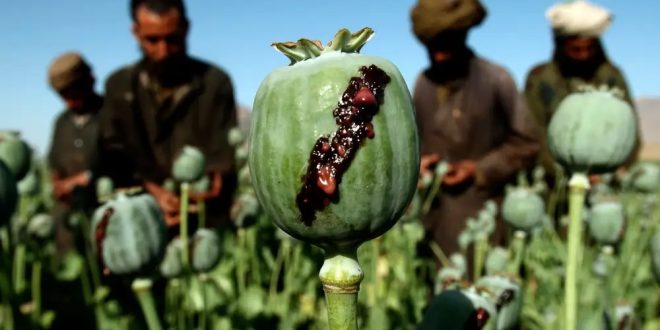AT News
KABUL – In a developing crisis for Afghanistan’s economy, farmers are facing immense challenges as the Taliban’s opium ban enters its second year. The ban imposed in early 2022 encompasses all narcotics, including opium poppy cultivation, and has left farmers struggling to adapt to alternative crops that prove to be insufficiently profitable.
As the world’s largest producer of opium, accounting for 85% of global production, Afghanistan’s agricultural landscape has been significantly affected by the ban. The Taliban’s decree did not provide farmers with a smooth transition plan for shifting to other crops; instead, they were left to follow the ban without adequate support.
Recent reports by independent researcher David Mansfield indicate that the ban has led to a remarkable 80% reduction in poppy cultivation in southern Helmand province, marking the most significant decrease since 2001. While counternarcotics initiatives aim to address widespread addiction in the country, the ban’s impact on the Afghan economy has been severe.
Analysts from the United States Institute of Peace warn that the ban will impose substantial economic and humanitarian costs on the Afghan population. Vanda Felbab-Brown, an expert on organized crime and the underground economy, emphasizes that the Taliban lacks the capacity to facilitate a sustainable transition for farmers who have switched to alternative crops but are struggling to make ends meet.
Mansfield estimates that the ongoing opium ban has resulted in a staggering $1.3 billion loss in net income for farmers and the elimination of 450,000 jobs at the farm level. Additionally, the ban’s effects on ancillary industries associated with opium production, such as processing, transportation, and packaging, are expected to have a cascading impact.
The Afghan opium trade, which generated $2.7 billion in 2021, equivalent to 9% to 14% of the country’s gross domestic product, is now facing a significant decline. Shah Mehrabi, a member of the Supreme Council of the Central Bank and an economics professor, warns that this loss of revenue could lead to an overall decline in Afghanistan’s GDP.
Experts argue that while addressing drug addiction is crucial, imposing a ban without a comprehensive development strategy, especially in a weak economy where displaced opium farmers lack viable alternative sources of income, is unlikely to yield long-lasting results.
To mitigate the adverse effects of the ban, experts call for the implementation of alternative development programs, such as promoting the cultivation of crops like saffron, and urge the international community to provide subsidies and access to markets for these newly cultivated crops.
In a country facing significant challenges, including the Taliban’s restrictive measures on women’s participation in the workforce, the ban on opium poppies further exacerbates the economic struggles of Afghanistan, leaving farmers, once reliant on the poppy industry, in dire need of sustainable solutions.
 Afghanistan Times
Afghanistan Times




